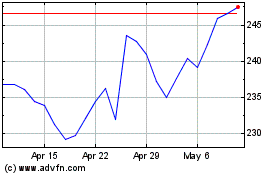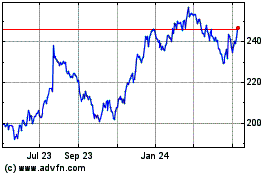Union Pacific Profit Falls 22% on Weak Freight Volume -- Update
January 21 2016 - 2:39PM
Dow Jones News
By Laura Stevens and Betsy Morris
The dismal energy environment slammed Union Pacific Corp. in the
fourth quarter, causing the railroad's earnings to fall 22% from a
year ago and the company to miss Wall Street expectations.
The company sustained steep declines in shipments of such
higher-margin businesses as coal, crude oil and fracking sand plus
a sharp drop in its fuel surcharge revenue, causing profit to fall
to $1.12 billion, or $1.31 per share. Analysts polled by Thomson
Reuters had expected earnings of $1.42 per share. The net impact of
lower fuel prices, including the decline in fuel surcharge
revenues, reduced earnings per share by 11 cents in the quarter
compared with last year.
"Another quarter of solid pricing gains were not enough to
offset the 9% decrease in total volumes," Chief Executive Lance
Fritz said on an earnings call with analysts.
The news sent Union Pacific's stock down more than 8% in early
trading, though shares recovered somewhat by early afternoon, when
they were down 3.1% at $71.31. Their 52-week high is $124.52.
The railroad said shipments of crude oil plunged 42%, and loads
of fracking sand used to drill wells fell by 52% in the quarter.
Coal, one of Union Pacific's largest businesses, fell by a fifth as
temperatures were higher than average and power plants used more
natural gas. Coal inventory levels reached 105 days through
December, 39 days above normal and 43 days above the same month a
year ago, executives said.
Energy will continue to weigh on earnings in the first quarter,
executives told analysts on the earnings call. Coal volume is
expected to decline by about 20% in the quarter, and full-year
total volumes are expected to be slightly down, depending on the
overall economy.
Union Pacific executives said they're getting mixed economic
signals from U.S. consumers. It appears that consumer spending is
shifting away from goods, such as retail, and more toward services,
they said, which is affecting their business mix. Auto shipments
rose 8% in the quarter as consumer demand remained strong, but the
executives cautioned that auto sales might not be sustainable at
current record levels.
When asked, the executives said they couldn't predict whether
the current rail downturn pointed toward a recession. "Certainly,
our volume drop-off, as the 2015 year progressed quarter-to-quarter
and as we're entering 2016, is dramatic," Mr. Fritz said on the
call. But "it's not approaching what we experienced in 2008 to
2009."
Union Pacific reiterated its opposition to rail mergers, saying
it doesn't think a big rail merger would improve safety or
efficiency and that it would be a "disincentive to capital
investment."
Without mentioning Canadian Pacific Railway Ltd.'s roughly $30
billion bid for Norfolk Southern Corp., executives said that one
big merger could trigger others, and it is monitoring the
situation.
"Our focus right now is on running a safe, efficient business,"
Mr. Fritz said in an interview. "We are monitoring this proposed
merger, and any proposed industry consolidation closely. As the
situation evolves, we'll do what is right for our shareholders and
our stakeholders."
Union Pacific's balance sheet is in excellent shape, he added.
"We know we'll be able to handle whatever we need to do looking
forward," he said.
Write to Laura Stevens at laura.stevens@wsj.com and Betsy Morris
at betsy.morris@wsj.com
(END) Dow Jones Newswires
January 21, 2016 14:24 ET (19:24 GMT)
Copyright (c) 2016 Dow Jones & Company, Inc.
Union Pacific (NYSE:UNP)
Historical Stock Chart
From Mar 2024 to Apr 2024

Union Pacific (NYSE:UNP)
Historical Stock Chart
From Apr 2023 to Apr 2024
